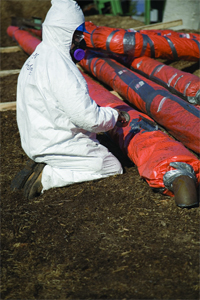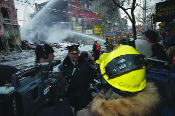
Features
Leadership
Lessons learned: On-the-job training, experience necessary to become well-rounded firefighter
No matter how detailed and in depth a firefighter’s education, there are many lessons that can only be learned after joining the department. Some of these lessons come from training; others are learned in the heat of battle – literally.
April 28, 2008
By James Careless
 |
| Specialized skills such as hazmat training and dealing with media are generally learned through on-the-job experience and additional education long after firefighter school. |
No matter how detailed and in depth a firefighter’s education, there are many lessons that can only be learned after joining the department. Some of these lessons come from training; others are learned in the heat of battle – literally.
When probies start working at their first fire hall, it’s not just experience they lack, but a range of specialized skills. “This is because the firefighter level one course covers a broad spectrum of basic fire fighting, but it doesn’t cover anything external to that,” says Lt. Tim Jenkins of the Charlottetown Fire Department. “Those extra skills have to be taught after the recruit has left college.”
At the Cornwall Fire Department in Ontario “our people are taught skills such as hazmat, water/ice rescue and confined-space operations,” says Capt. Richard McCullough. “Right now, we’re learning about high-angle rescue at my department. That’s something I never knew about when I started the job.”
“The use of the Incident Command System and how it is implemented at an actual scene is another thing you just can’t learn in school,” McCullough says.
“Officers’ skills are another thing that they don’t teach you at school,” adds Lt. Jenkins. “What they also don’t teach you is that, at the end of the day, how you deal with people is still your most important skill.”
For firefighters, this skill is particularly vital because “you are usually dealing with members of the public when they are extremely vulnerable,” says Deputy Chief Vern Starling of the Victoria Fire Department in B. C.
“You can teach people manual things in school like how to tie a knot or raise a ladder, but you cannot teach the kinds of behaviours firefighters need to do their work safely and effectively,” observes Deputy Chief Starling. “Staying calm in an emergency situation, understanding and dealing with the range of emotions you experience on different types of calls; these are things that you can only learn on the job, and only after you’ve gained confidence from working a number of fires.”
 |
| PHOTO BY KEITH HAMILTON |
Caution is another thing that doesn’t come naturally to new firefighters, but is learned as they get a handle on the realities of the job.
“With experience, you learn to take that extra few seconds beforehand to figure out what you should be doing, rather than rushing into a fire a few seconds sooner,” says Lt. Jenkins.
“Sizeup is an extremely important skill that only comes with experience on the job,” adds Capt. McCullough. “As a site commander, you learn to properly size up situations, to ensure you understand precisely what you are dealing with before making any rash decisions. Sizeup starts when you leave the firehall; both from what you can learn from Dispatch and any clues you can detect on your own, from how the wind is blowing to the kind of smoke there is at the scene.”
“One thing they just can’t teach you in school is the experience of being in an actual fire,” says McCullough. “You can take part in all the mock incidents you want, but it’s only when you are working with the real thing that you find out what it’s like.”
Fortunately for newbies, fire departments put a lot of emphasis on mentoring. “Training can never replace the experience that veterans can offer newbies,” Jenkins says. “It’s a real learning culture in the firehall and out on the incident scene, with experienced members looking out for the rookies.”
What do they consider the most important advice?
“Ask a lot of questions before you do anything,” says. Jenkins. “And don’t do anything that you are not comfortable in doing.”
“When you are training new recruits, help them build their confidence through mentoring and on-the-job guidance,” says Deputy Chief Starling. “As they gain experience and confidence, they will be able to carry the emotional load that goes with the job more easily, and make better common sense decisions when it counts.”
Finally, for wisdom combined with wit, Capt. Nick Antoft of the Halifax Regional Fire & EMS Service notes that “not everyone moves out of the way of a 20-tonne vehicle bearing down on them with lights flashing and sirens blaring and “things can catch fire when it’s -30 C in a raging snowstorm, or in the middle of a downpour. Given enough heat, everything eventually burns.
Print this page